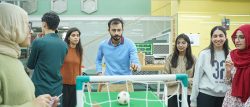According to The Right To Education in Pakistan, 5.035 million people with disabilities are deprived of access to their cities. The Government of Pakistan ratified the UN Convention on the Rights of Persons with Disabilities in 2011. However, none of these provisions are implemented or enforced.
The term “Kaabil” translates to “able” or “capable” in English, putting forward the ideas of empowerment and ability. Project Kaabil aims to create awareness about disability as a problem of design, and not personhood or personal capability. The structure of Karachi as a city in its current design makes it impossible for a person on a wheelchair to feel included or welcome in their own city. This project aims to put forward the experience of wheelchair users who are trying to navigate movement in the city of Karachi.
Design is the translation of value. We question whether a city can value movement that is different from walking and driving. The urban infrastructure of a city must accommodate the needs of all citizens and residents who seek shelter there. Project Kaabil is about demanding space and access, and changing the narrative about persons with different-abilities. We believe that accessible public and private spaces will change the urban and moral fabric of our society for the better.
Disability is not a medical problem. It is a design problem.
This blog was written by Hasan Naqvi, Senior at HU’s School of Science & Engineering, majoring in Electrical Engineering, Class of 2018.
To read more Blogs by our HU Lions, click here.




